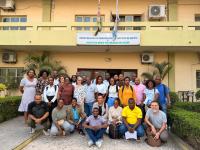"Health as a right is a political aspiration", declared Theodore Marmor during event at ISAGS’ headquarters
Healthcare, cross national researches, regulation and the reforms of the sector were the main issues addressed during the conference “Challenges for universal health systems in the 21st century”, presented last Wednesday (12) by Theodore Marmor, Professor Emeritus at Yale University. Marmor came to Rio de Janeiro after an invitation from the South American Institute of Government in Health (ISAGS) to open the workshop “Strengthening the State, Regulating the Market: Challenges for UNASUR national health systems”.
The conference was presented in English with live Internet transmission and counted with simultaneous translation to Spanish and Portuguese. Internet users were able to take part in the debate, by sending questions by e-mail and through social networks. Marmor began his exposition by presenting various approaches on cross national health researches, highlighting the danger of “naive transplantation”, which would be equivalent to the reproduction of successful health system models from other countries. On the other hand, he also mentioned the “intellectual fallacy”, which could be explained as the negative of learning through the exchange of experiences.
Public Health vs. Private insurance
The academic pointed out the fundamental differences between the private health insurance and the principles of public health, arguing that, for the logic of private health, there is a selection in the base, with the separation between those who are healthy and those who are not. With regard to the values of public health, he highlighted the commitment with no financial barriers, for an accessible healthcare to all the population. When talking about the private sector, Marmor identified the growth of a pro- market conception in the contexts of political discussions, pointing out an approach that sees health as merchandise. The lecturer was ironic: “From the neoliberal perspective, if bread were free, no bakery would have any bread left. They talk about ill and injured people as people who are buying bread”.
Obamacare
Ted Marmor briefly presented the Obamacare – North American healthcare programme, initiated this year – exploring its complexities and critical aspects. Marmor affirmed that the initiative, developed by traditional economists, could be seen as a “patchwork”.
According to Marmor, the new model consists of five categories: socialized medicine for military veterans, social health insurance for older Americans (Medicare), benefits package for people with low income (Medicaid), work related private health insurance and the emergency programme dedicated to victims of accidents and other individuals at risk.
Right to health, regulation and financing
In an interview for ISAGS, Marmor affirmed that “health as a right is a political aspiration” and that the efforts for the extension of coverage reflect this thought. The academic observed that, however, there is “a tension between the multiple programmes for the extension of coverage and the commitment with the claims for equal access and citizenship”.
Concerning the aspects of the regulatory health market, the professor affirmed that public authorities must impose restrictions to prices and define clear rules about conducts that should be avoided. When talking about financing, he declared: “If a programme is not sustainable in the long term, it should not be sustained”.
The conference and the complete interview with Ted Marmor will be available at ISAGS’ website in a few weeks. Marmor’s conference was the starting point of the workshop “Strengthening the State, Regulating the Market: Challenges for UNASUR national health systems”, which will be held at ISAGS’ headquarters until November 14, with the participation of representatives for the Ministries of Health of the 12 South American nations. One of the activities of the event involves the presentation of the regulation models of the private health markets of the countries of the Bloc, based on guidelines previously elaborated by the Institute.



